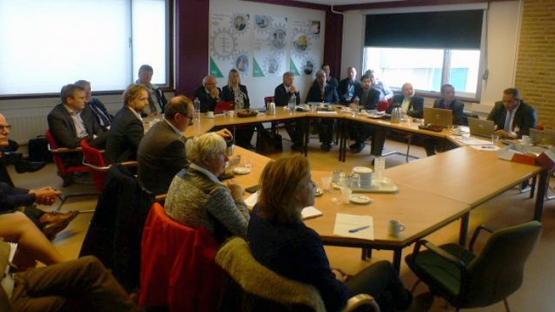The Nuclear Research Group of the Netherlands has promoted and further developed a strong safety culture based on a mature management system at its High Flux Research Reactor in Petten, concluded experts of the IAEA Integrated Nuclear Safety Assessment of Research Reactors (INSARR) mission yesterday. The Group pays strict attention to safety procedures in waste management, radiation protection of workers, effective emergency plans as well as training staff in various areas to maintain the reactor to the highest standards, the experts found.
The High Flux Research Reactor is one of the main radioisotope production facilities in the world, supplying about 70% of the medical isotopes in Europe, and contributes to about 30% of world production.
“By requesting IAEA INSARR missions, the Netherlands has made a strong commitment to nuclear safety and to its continuous improvement,” said Greg Rzentkowski, IAEA Director of Nuclear Installation Safety. This established practice to perform periodic safety reviews every five years will allow for systematic and comprehensive assessments of the reactor fitness for service and identification of practical upgrades to maintain safety of long-term operation, he added.
The expert team, made up of IAEA nuclear safety experts and international experts in the field of research reactor safety, conducted a comprehensive assessment of the safety procedures and regulations at the High Flux Reactor from 4 to 11 October. The IAEA team provided the Nuclear Research Group with recommendations and suggestions to further enhance safety measures at the facility.
“The IAEA peer review team noted the implementation by Nuclear Research Group of a mature management system and good practices in the areas of training and qualification of staff and safety assessment,” said Amgad Shokr, INSARR’s team leader.
The team also noted a high level of the implementation of the recommendations of the previous IAEA INSARR mission conducted in 2011, which included follow-up actions to the relevant lessons learned from the March 2011 Fukushima nuclear power plant accident.
“The Nuclear Research Group is taking benefits from the IAEA safety reviews and is committed to implement the recommendations from these missions for continuous improvement of safety as well as safety culture,” said Managing Director Niels Unger. The Nuclear Research Group will request a follow-up mission within the next two years.
The IAEA INSARR mission is a peer review of the safety of research reactors that is conducted on the basis of the IAEA Safety Standards. The Netherlands’ decision to invite the IAEA mission is part of its safety enhancement programme and the international efforts, led by the IAEA, to strengthening the safety of research reactors.




